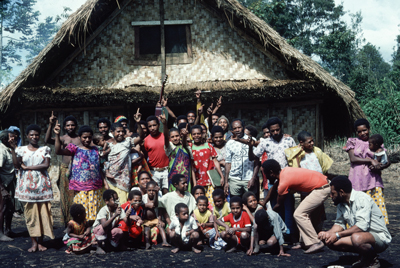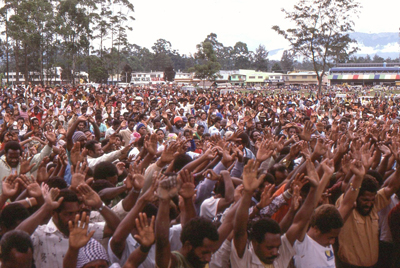30. The first years |
Sven speaks: I have already mentioned that one of my first tasks was to make the church in Mount Hagen, today named Philadelphia in Warakum, to operate legally. Ludvig and Hilding had together with Matti Kumpulainen (a Finnish missionary, ref Chapter 21) designated the national brother Andrew Kauga to be the leader of the Pentecostal group in Mount Hagen. Andrew had studied at a Catholic seminary. He never became a Catholic priest, since his calling and salvation had a different focus, but thanks to the studies, he had more Bible knowledge than most others and was therefore considered suitable to be a leader. However, Matti along with Ludvig and Hilding made all the business-related decisions. This was how the situation looked when we came to Mount Hagen in August 1976. As previously mentioned, we now had to establish a functioning church with an active board. The assembly would elect a board, which was to have full responsibility. Before this, as detailed above, the Missionaries made all the decisions. Of course, I continued to have a major influence, but not through any formal position but based on my spiritual authority. I could give advice, but as from now, the local Church board was responsible for all of its own decision making. After some discussions and consultations, I suggested that the congregation elects the following board. Since Andrew was already a full-time paid employee, it would be natural to choose him as the Senior Pastor of the Church. Alan Lepa, Kisam Kasen, Lakoo Minson and Leaku (I have unfortunately forgotten his last name) were four other indigenous brothers who were a part of the first board. Alan, Kisam and Lakoo were relatively young men but Leaku was an older man. None of these were employed by the church, but had "regular" jobs. Kisam became the Assistant Pastor and Lakoo became the secretary as well as the treasurer. The congregation voted in accordance with my proposal. Lakoo (ref Chapter 29) had no knowledge of being a secretary or treasurer, so it was my job to teach him how to do this. When he was elected I handed him the church checkbook. I told him that from now on I was not going to be the one to write out checks, but that I, for one year, would teach him how checks and accounting worked. It attracted a lot of attention when other missionaries found out that I handed over the checkbook to Lakoo. “You can’t do that!” a lot of people thought. I then asked if they thought that the nationals had received the same Holy Spirit as the missionaries and if the same Holy Spirit that made us honest could make nationals honest as well? This was obviously the case, which meant that they had to answer yes and then I wondered why these brothers then weren’t considered trustworthy. Lakoo could independently perform these tasks after a year of my help. 
Kundi Pok, who came to be one of the closest friends of mine, was not included on the board of Philadelphia in Mount Hagen, but had received a small salary to work with the church in Tega. He meant a lot to the Pentecostal development in Papua New Guinea (ref Chapter 33). In mid-1977, the Church in Tega had grown to around 50 members. They were now big enough to become an independent church and Kundi became the pastor. I told the Tega church that it was now their job to make sure Kundi got his salary. They then raised his salary from 40 kina per month to 80, which at that time was considered a very good salary for a pastor. Even when Samuel Halldorf visited Papua New Guinea for the first time in 1975 (ref Chapter 21), he realized that if there would to be any lasting success with Ludvig’s and Hilding’s evangelization work, it was necessary to get started with some Bible teaching for new believers, especially for those who were going to become evangelists and pastors. When we met Samuel on our first visit to Papua New Guinea in March 1976, he was there to do a two-week long Bible teaching. We then proceeded to do regular bible study weeks for young evangelists. This became the foundation for our Bible teaching. We got help from various missionaries and pastors from Australia and Sweden as well. We were contemplating whether we should start a Bible school with longer and more cohesive courses. Gunnar and Elizabeth Swahn came to Mount Hagen in October 1978 to help us out with our ongoing Bible study weeks and other missionary activities. Gunnar's task was also to investigate the possibility of starting a Bible school. However, he came to the conclusion that it was better to take advantage of the Assemblies of God's Bible School in Maprik. The Swahns went back to Sweden in January-February 1980. |
During the first few years we had arranged services outdoors in downtown Mount Hagen each day at noon. On Saturdays, we had open air services in other parts of the city as well as in its outskirts. I cannot help but express my admiration for Allan Lepa, who appeared on nearly every open air lunch service. He had a full-time job at the road administration but used his lunch break to evangelize instead of having lunch. There were a lot of people who came to faith in God during these open air services. Many of them didn’t live in Mount Hagen but in the villages surrounding the city. We could eventually plant churches on several of these sites. 
In the surrounding villages, there were schools with classes from year 1 up to year 6. If you wanted to continue studying, which not so many did, one had to apply to the high school in Mount Hagen. There were classes from year 7 up to year 12. Yea 10 to 12 were roughly equivalent to a secondary education (gymnasieutbildning) in Sweden. The school was a boarding school as well, which meant that the students spent much of their spare time together. One day in early 1979 I was visited by a couple of students from the high school. They told me that a group of students had started to arrange joint prayer meetings at the school and these young people were the leaders of the group. Many of the youngsters had experienced baptisms in the Holy Spirit during their prayer meetings. Now, as the Bible tells us, these youths wanted to get baptized in water, although they originally were Catholics. I was very touched by the young people’s desires, but explained that I needed to have a talk with the group about what baptism meant before I baptized them. The group leader invited me to come to the school. We used a classroom where we could talk to each other. In addition to the prayer group, which consisted of ten people, we were joined by a number of other students during the talk. When I had finished the teaching on baptism, another eleven young people gave themselves to God. A week later we had the baptism and there were over 20 young people who were baptized to Christ. The Catholics, and even the Lutherans, criticized us for having baptized "their youths". But youngsters clung on to their newfound faith and became a great blessing to their home villages. They boldly testified about their faith in Christ and were thus bringing more people to salvation. Later on, churches were planted in some of these villages. God's word had success in this and many other ways. God was with us and the testimony of salvation was spreading – not only through our preaching, but also by God leading people to us in amazing ways. In the beginning of 1979, the churches in Sweden, those who paid our support, though that it would be a good idea for us to go home for a bit of rest. However, I did not have any great desire to leave Papua New Guinea at the moment, since I had a lot of work going on and these things would not work if I was not there to supervise them. God confronted me about this and asked a very simple question: "Is this your or my business? If it is my business, I will watch over it". After this experience, I have always been at peace when it comes to the matter of God watching over his work. It does not stand or fall because of my presence. In June 1979, we traveled back to Sweden. We were in Sweden for six months. Kundi Pok came along with us to Sweden and stayed there for the first three months. |